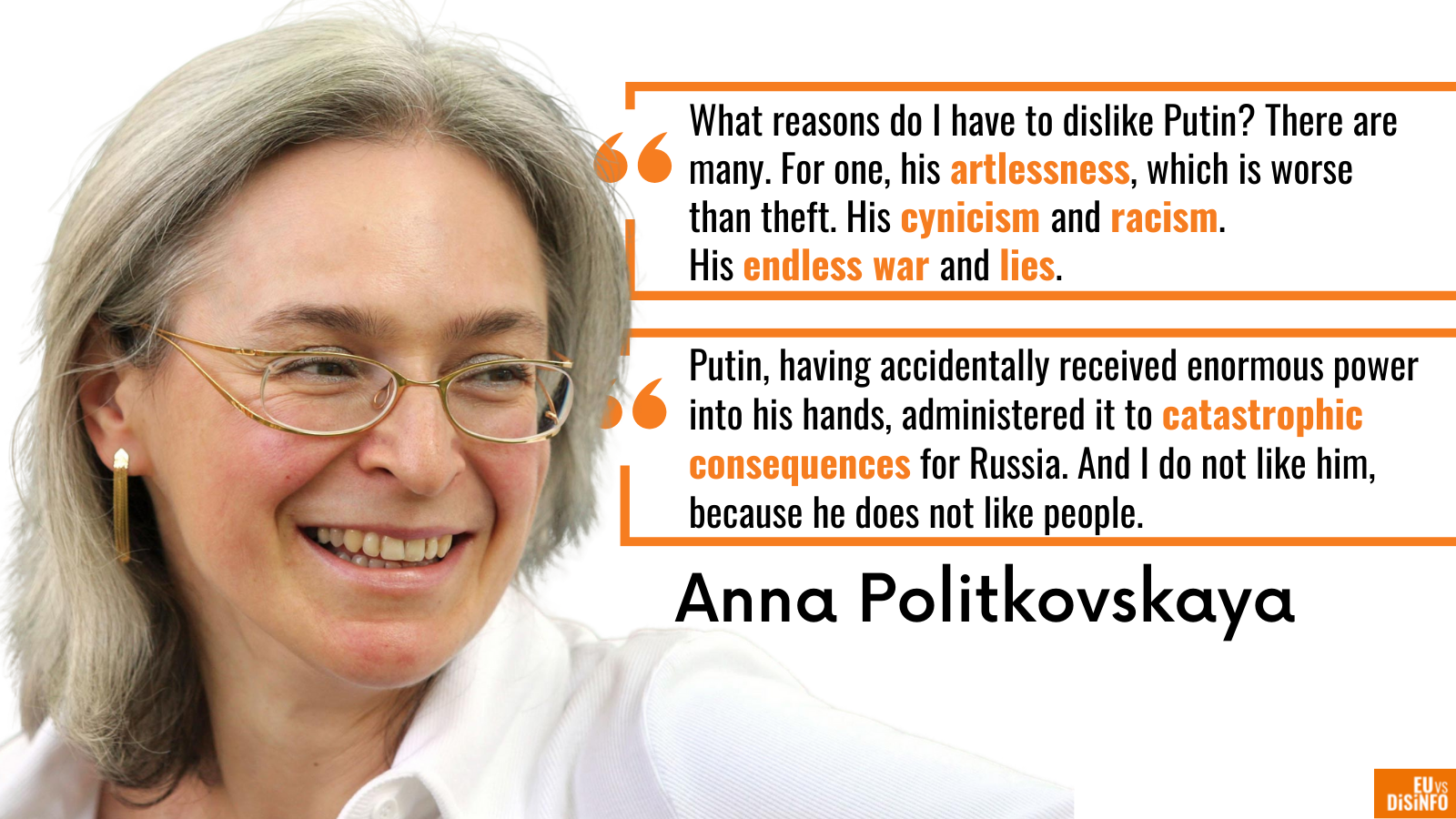Anna Politkovskaya was a prominent writer and journalist for Novaya Gazeta, an independent Russian newspaper edited by 2021-Nobel Peace Prize winner Dmitry Muratov. Over time, Politkovskaya and Novaya Gazeta came under ever more frequent attacks from Russian authorities. On 7 October 2006, Politkovskaya was found murdered in Moscow.
Source — EUvsDiSiNFO — October 7


Anna Politkovskaya was a prominent writer and journalist for Novaya Gazeta, an independent Russian newspaper edited by 2021-Nobel Peace Prize winner Dmitry Muratov. Over time, Politkovskaya and Novaya Gazeta came under ever more frequent attacks from Russian authorities. On 7 October 2006, Politkovskaya was found murdered in Moscow.
Each year we commemorate 7 October to respect Politkovskaya’s memory and the legacy she left behind. Each year we see that conditions have deteriorated for free media in Russia. Her killing has come to mark the acceleration of a sad trend of silencing the voices of Russian opposition figures, NGO activists, and journalists.
Why 2022 is different
Marking 7 October is different this year. Russia’s full-scale war against Ukraine, launched on 24 February, has changed everything, both inside Russia and far beyond.
This year, it is more clear than ever what the absence of critical journalism and independent, quality media means. Russia needs people like Anna Politkovskaya like never before.
Tough repression
Russian state repression of the Novaya Gazeta newspaper reached its peak this year. In March, authorities issued a second official warning to the paper, and in September they closed it down completely. Beforehand, the bulk of its employees had seen which way the wind was blowing and fled Russia to establish a new Novaya Gazeta Europa.
Further, general censorship laws came into effect in Russia in early March and have since been tightened several times. More than 130 media outlets have been declared ‘media foreign agents’.
Into the heart of darkness
As Russia descends further into the abyss of war, her society fabrics, ethical standards, and plain honesty are on now on the line.
Each week we analyse developments in the Russian information sphere. Our database documents disinformation spread on Russian state TV, in broadsheet publications, key online platforms, and beyond.
For years, Kremlin-speak used to be repetitive. Just say, ‘The West is bad. We are great,’ and repeat. Watching the main Russian outlets required some stamina, but you could stomach it.
Now, during a full-scale war, senior personalities fill the information environment with the most despicable smears against other people, Ukrainians in particular; praise for famine and economic recession; reckless nuclear threats not heard even during peak Cold War years; and sheer craziness, like calling for the nuclear bombing of Queen Elizabeth’s funeral. But perhaps worst of all, we have heard outright calls for genocide against Ukrainians, the eradication of Ukraine as a country, and even for its nuclear destruction. The information space is not only weaponised. It has become obscene.
Words can kill
There is a strong correlation between the deterioration of journalism in Russian state outlets and praise of Russian superiority and brutality by soldiers on the battlefield. The mistreatment of civilians, torture, arbitrary killings, and abuses all begin by dehumanising the opponent. This is basic knowledge, but Russia repeats it time and again.
Anna Politkovskaya made her name by going into the field and interviewing, documenting and reporting how things really were. She made many Russians understand the horrors of the Chechen wars of the 1990s and the situation in the new millennium. For many years it was well known that Novaya Gazeta was read with the outmost interest not only by the Russian intelligentsia and academia but also by government elites as a way to obtain credible information through the haze of propaganda and disinformation.
We mark 7 October by letting some of Anna Politkovskaya’s own words speak today:
“We live in an era where normal values have been displaced. The good is called bad, the bad – good”
“Putin, having accidentally received enormous power into his hands, administered it to catastrophic consequences for Russia. And I do not like him, because he does not like people. He can’t stand us. He despises us. He believes that we are a means him only, a means to achieve his own personal power goals. Therefore, he can do anything he wishes to us, plays with us as he pleases, destroys us, if he wishes. For him, we are nobody. And he, having accidentally scrambled to the top, is now a king and a god, whom everybody should worship and fear.”










